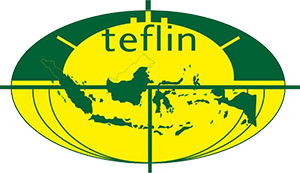Integrative Learning in Islamic Indonesian EFL Classroom: Challenges and Opportunities
Abstract
Full Text:
PDFReferences
Akbari, Z. (2015). Current challenges in teaching/learning English for EFL learners: the case of junior high school and high school. Procedia - Social and Behavioral Sciences, 199, 394–401. https://doi.org/10.1016/j.sbspro.2015.07.524
Akrim. (2019). An Integrative Islamic Education Learning System in Khairul Imam Junior High School, Medan. Proceedings of the 6th International Conference on Community Development (ICCD 2019). https://doi.org/10.2991/iccd-19.2019.15
Alfian, A., Yusuf, M., & Nafiah, U. (2021). Integrating Islamic values in teaching English: lessons learned from an integrated Islamic school. Elsya : Journal of English Language Studies, 4(1). https://doi.org/10.31849/elsya.v4i1.7322
Fazriyah, N., Supriyati, Y., & Rahayu, W. (2017). The effect of integrated learning model and critical thinking skill of science learning outcomes. Journal of Physics: Conference Series, 812, 012014. https://doi.org/10.1088/1742-6596/812/1/012014
Handayani, M. (2018). Developing thematic-integrative learning module with problem-based learning model for elementary school students. Jurnal Prima Edukasia, 6(2), 166–176. https://doi.org/10.21831/jpe.v6i2.14288
Hibatullah, O. F. (2019). The challenges of international EFL students to learn English in a non-English speaking country. Journal of Foreign Languange Teaching and Learning, 4(2). https://doi.org/10.18196/ftl.4240
Irma, I. (2020). Challenges encountered by EFL teachers in teaching productive and receptive skills at SMP 2 Mattirobulu Pinrang. Al-Iftah: Journal of Islamic Studies and Society, 1(2). https://ejurnal.iainpare.ac.id/index.php/aliftah/article/view/1859
Leonard, D. J. B. (2012). Integrative learning: A grounded theory. Issues In Integrative Studies, 30, 48–74.
Yin, K.R. (2011). Qualitative Research From Start To Finish. The Guildford Press.
Makmur, A., & Marzulina, L. (2018). If our English isn’t a language, what is it?" Indonesian EFL student teachers’ challenges speaking English. Qualitative Report, 23(1), 129–145. https://doi.org/10.46743/2160-3715/2018.3013.
Manshur, F. M., & Husni, H. (2020). Promoting religious moderation through literary-based learning: a quasi-experimental study. International Journal of Advanced Science and Technology, 29(6), 7. http://sersc.org/journals/index.php/IJAST/article/view/19864
Munadi, M., & Dewi, F. A. I. (2019). Implementation of integrated learning based integrated Islamic school network curriculum in SMA ABBS Surakarta. Al-Ta Lim Journal, 26(1), 65–75. https://doi.org/10.15548/jt.v26i1.507
Nuryantini, A. Y. (2018). Integration science and religion in Physic subject. An analysis in Islamic higher education. TARBIYA: Journal of Education in Muslim Society, 5(1), 11–18. https://doi.org/10.15408/tjems.v5i1.9508
Octaberlina, L. R., & Anggarini, I. F. (2020). Teaching vocabulary through picture cards in Islamic elementary school: a case study in Nida Suksa School, Thailand. Madrasah, 13(1), 26–38. https://doi.org/10.18860/mad.v13i1.9649
Octaberlina, L. R., Anggarini, I. F., & Muslimin, A. I. (2020). Virtual English teaching in remote area: a case study. Journal of Critical Reviews, 7(19), 7. https://www.jcreview.com/?mno=11941
Octaberlina, L. R., & Ikhwanul Muslimin, A. (2020). EFL students perspective towards online learning barriers and alternatives using Moodle/Google Classroom during Covid-19 pandemic. International Journal of Higher Education, 9(6), 1–9. https://doi.org/10.5430/ijhe.v9n6p1.
Rohmana, W. I. M. (2020). Immersing Islamic value in English language teaching: a challenge for English teachers. Scope : Journal of English Language Teaching, 5(1), 47. https://doi.org/10.30998/scope.v5i1.6404
Sarip, S., & Sunhaji, S. (2021). Integrated learning model of Islamic religious education with science. The 1st International Conference of Humanities and Social Science (ICHSS) 2021, 1, 632–643. https://doi.org/https://doi.org/10.1234/ichss.v1i1.79
Smeer, Z. B., & Rosyidah, I. (2021). Religious moderation in Islamic education learning to counter radicalism: study at SMAN 1 Sugihwaras Bojonegoro. ULUL ALBAB Jurnal Studi Islam, 22(1), 176–202. https://doi.org/10.18860/ua.v22i1.11837
Tukiyo, T., Haryono, P., & Ari, S. (2022). Improving multiliteracy ability in the integration of Islamic and science learning. Al Ishlah, 1. https://doi.org/https://doi.org/10.35445/alishlah.v14i4.2433
Wulan, E. R., Gunawan, H., Fauziah, W., & Kratz, F. (2021). Integration of science, technology, and Islamic values to enhance expected learning outcomes in French higher education. Jurnal Pendidikan Islam, 7(1), 95–108. https://doi.org/10.15575/jpi.v7i1.12765
Zaqiah, Q. Y., Heryati, Y., & Narongraksakhet, I. (2021). Implementation of the thematic-integrative learning to enhance students skill in the 4.0 era. Jurnal Pendidikan Islam, 7(2), 243–254. https://doi.org/10.15575/jpi.v7i2.15220
Zeleke, Y. D. (2022). Investigating the Implementation of Process Approach to the Teaching and Learning of Writing Skills: The Case of Ethiopian University. Journal of English Teaching and Learning Issues, 5(1), 63. https://doi.org/10.21043/jetli.v5i1.13649
DOI: http://dx.doi.org/10.21043/jetli.v5i2.17091
Refbacks
- There are currently no refbacks.
Copyright (c) 2022 Ida Fitri Anggarini







